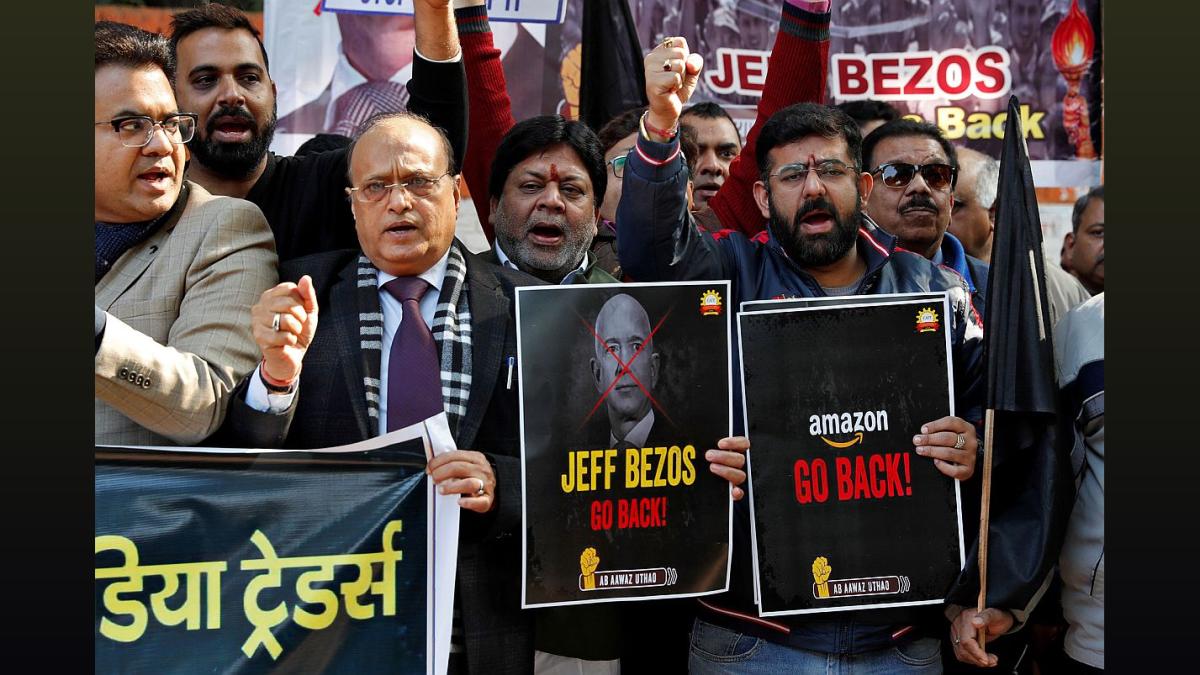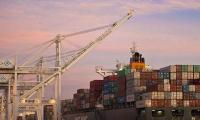FDI in E-commerce for Exports: India Aims for $350 Billion by 2030
India plans to allow foreign online sellers to export through inventory-based e-commerce, requiring changes in FDI policy, customs rules, and banking regulations. Experts highlight the potential to boost exports to $350 billion by 2030.

New Delhi, Dec 5 (PTI) There is a broad agreement within the government to allow foreign online sellers to undertake inventory-based e-commerce only for exports, though such a move would require requisite changes in different rules for its smooth operationalisation, sources said.
At present, the FDI policy does not permit foreign direct investment in the inventory-based model of e-commerce. FDI is allowed only in firms that are operating through a marketplace model.
Under the inventory-based model, online sellers are allowed to own the inventory of goods and services and sell them to consumers directly. On the other hand, the marketplace-based model of e-commerce involves a portal by an entity to act as a facilitator between a buyer and a seller.
At present, foreign e-commerce entities providing a marketplace can not exercise their ownership over the inventory i.e. goods purported to be sold. Such ownership over the inventory will render the business into an inventory-based model.
The e-commerce industry has suggested the government permit FDI in an inventory-based model of online trade only for export purposes. The commerce ministry's arm Directorate General of Foreign Trade (DGFT) has also supported the suggestion.
"We do not have any in-principle disagreement on this. When it comes to exports, there could be a carve-out. But that has to be formalised. If they (e-commerce firms) are exporting, the inventory restrictions may not necessarily apply to them.
"I can only say that in the government, there is an understanding that the restriction of not allowing inventories models for e-commerce, does not apply purely for exports, one of the sources said.
Providing this carve-out, according to them, will have multiple benefits and that include greater access in global markets to small artisans and product owners; an addition in foreign exchange earnings, and an increase in exports.
"It would also not create any kind of competition with local players, so it is a win-win for everybody, the source said.
When asked if there is a need for a tweak in the FDI policy for this, the source said there is an understanding that such a change perhaps could be done.
Another source said that the issue needs to be examined in the light of conditionalities of Press Note 3 of the department for Promotion of Industry and Internal Trade (DPIIT) which does not distinguish between exports and domestic sales.
"Press note 3 will require a clarification, the source said adding a mechanism can be put in place so that a separate inventory is maintained for exports and possibly such firms can be allowed to operate from special economic zones or from export-oriented units (EOUs).
These changes will have to be incorporated to allow EOUs to have e-commerce warehouses as at present such enclaves are used only for manufacturing purposes.
Changes are also required in customs rules for products which foreign consumers will return as that is common in e-commerce business.
They added that amendments are required in the RBI and Foreign Exchange Management laws for facilitating payments as in the ecommerce business the payment may not come in 270 days, which is a requirement under FEMA.
To facilitate discount sales and payments, FEMA rules need to be modified.
"We need a mindset change. We have to make changes in FEMA guidelines, EOU policy needs to be changed. So a lot of changes are required. We need to understand that e-commerce operates in a slightly different ecosystem, you can not treat it as a normal trade in goods and services," the source said.
The government is keen to push exports through e-commerce and has laid special emphasis on it in the Foreign Trade Policy (FTP).
The DGFT last month inked a memorandum of understanding with US-based Amazon to provide training to MSMEs in 20 identified districts in areas such as making digital catalogues and tax-related issues with a view to promoting exports through e-commerce medium.
The capacity building session will allow MSMEs to learn about imaging, digital cataloguing of their products, tax advisory amongst others, the commerce ministry has said adding the objective is to leverage e-commerce platforms to support local exporters, manufacturers, and MSMEs in reaching potential international buyers.
The DGFT is also in discussion with various e-commerce platforms like Flipkart/Walmart, Ebay, Rivexa, Shopclues, Shiprocket, DHL Express to have similar collaboration in other districts of the country under the Districts as Export Hubs initiative and promote e-commerce exports from the country.
Think-tank Global Trade Research Initiative (GTRI) in its report has said though huge potential is there in India to boost exports through e-commerce medium, banking issues like reluctance to process forex received through alternate channels and high processing fees are hindering the growth of e-commerce exports from India, and there is a need to bring mindset change to unlock the sector's potential.
Unlocking India's e-commerce export potential to USD 350 billion by 2030 requires addressing banking issues that hinder growth and increase operational costs, GTRI has said.
Small e-commerce businesses often face challenges because banks are not equipped to handle low-value transactions efficiently. The key issues include reluctance to process forex through alternate channels, high processing fees, incorrect purpose code allocation, and limitations in the RBI's EDPMS (Export Data Processing and Monitoring System), according to the report.
At present, the FDI policy does not permit foreign direct investment in the inventory-based model of e-commerce. FDI is allowed only in firms that are operating through a marketplace model.
Under the inventory-based model, online sellers are allowed to own the inventory of goods and services and sell them to consumers directly. On the other hand, the marketplace-based model of e-commerce involves a portal by an entity to act as a facilitator between a buyer and a seller.
At present, foreign e-commerce entities providing a marketplace can not exercise their ownership over the inventory i.e. goods purported to be sold. Such ownership over the inventory will render the business into an inventory-based model.
The e-commerce industry has suggested the government permit FDI in an inventory-based model of online trade only for export purposes. The commerce ministry's arm Directorate General of Foreign Trade (DGFT) has also supported the suggestion.
"We do not have any in-principle disagreement on this. When it comes to exports, there could be a carve-out. But that has to be formalised. If they (e-commerce firms) are exporting, the inventory restrictions may not necessarily apply to them.
"I can only say that in the government, there is an understanding that the restriction of not allowing inventories models for e-commerce, does not apply purely for exports, one of the sources said.
Providing this carve-out, according to them, will have multiple benefits and that include greater access in global markets to small artisans and product owners; an addition in foreign exchange earnings, and an increase in exports.
"It would also not create any kind of competition with local players, so it is a win-win for everybody, the source said.
When asked if there is a need for a tweak in the FDI policy for this, the source said there is an understanding that such a change perhaps could be done.
Another source said that the issue needs to be examined in the light of conditionalities of Press Note 3 of the department for Promotion of Industry and Internal Trade (DPIIT) which does not distinguish between exports and domestic sales.
"Press note 3 will require a clarification, the source said adding a mechanism can be put in place so that a separate inventory is maintained for exports and possibly such firms can be allowed to operate from special economic zones or from export-oriented units (EOUs).
These changes will have to be incorporated to allow EOUs to have e-commerce warehouses as at present such enclaves are used only for manufacturing purposes.
Changes are also required in customs rules for products which foreign consumers will return as that is common in e-commerce business.
They added that amendments are required in the RBI and Foreign Exchange Management laws for facilitating payments as in the ecommerce business the payment may not come in 270 days, which is a requirement under FEMA.
To facilitate discount sales and payments, FEMA rules need to be modified.
"We need a mindset change. We have to make changes in FEMA guidelines, EOU policy needs to be changed. So a lot of changes are required. We need to understand that e-commerce operates in a slightly different ecosystem, you can not treat it as a normal trade in goods and services," the source said.
The government is keen to push exports through e-commerce and has laid special emphasis on it in the Foreign Trade Policy (FTP).
The DGFT last month inked a memorandum of understanding with US-based Amazon to provide training to MSMEs in 20 identified districts in areas such as making digital catalogues and tax-related issues with a view to promoting exports through e-commerce medium.
The capacity building session will allow MSMEs to learn about imaging, digital cataloguing of their products, tax advisory amongst others, the commerce ministry has said adding the objective is to leverage e-commerce platforms to support local exporters, manufacturers, and MSMEs in reaching potential international buyers.
The DGFT is also in discussion with various e-commerce platforms like Flipkart/Walmart, Ebay, Rivexa, Shopclues, Shiprocket, DHL Express to have similar collaboration in other districts of the country under the Districts as Export Hubs initiative and promote e-commerce exports from the country.
Think-tank Global Trade Research Initiative (GTRI) in its report has said though huge potential is there in India to boost exports through e-commerce medium, banking issues like reluctance to process forex received through alternate channels and high processing fees are hindering the growth of e-commerce exports from India, and there is a need to bring mindset change to unlock the sector's potential.
Unlocking India's e-commerce export potential to USD 350 billion by 2030 requires addressing banking issues that hinder growth and increase operational costs, GTRI has said.
Small e-commerce businesses often face challenges because banks are not equipped to handle low-value transactions efficiently. The key issues include reluctance to process forex through alternate channels, high processing fees, incorrect purpose code allocation, and limitations in the RBI's EDPMS (Export Data Processing and Monitoring System), according to the report.
You May Like To Read
TODAY'S MOST TRADED COMPANIES
- Company Name
- Price
- Volume
- Vodafone-Idea-L
- 11.65 (+ 3.56)
- 106772451
- Alstone-Textiles
- 0.28 ( -3.45)
- 44187760
- Mangalam-Industrial
- 0.88 ( -2.22)
- 39177573
- Sunshine-Capital
- 0.27 (+ 3.85)
- 35956340
- GMR-Airports
- 104.40 (+ 6.37)
- 30453005






